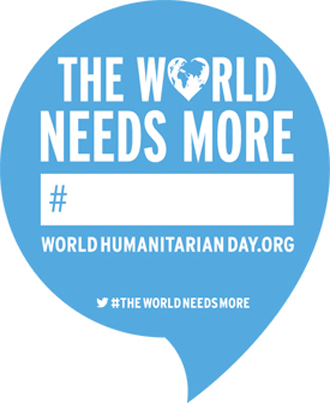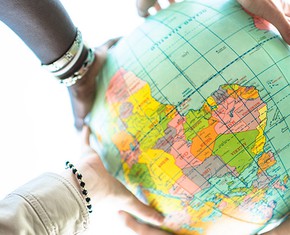The views expressed in our content reflect individual perspectives and do not represent the authoritative views of the Baha'i Faith.
Recently, Yazidi refugees trapped on Mt. Sinjar in Iraq have riveted the world’s attention. Innocent people fleeing war, they’ve received assistance from foreign militaries and from a large number of humanitarian aid workers.
In several African countries, a new outbreak of the Ebola virus has killed more than a thousand people, and humanitarian aid workers put themselves in danger to deliver many of the health care services those countries desperately need.
And in countless places we don’t hear about around the world, humanitarian aid workers labor every day to assist people who need help.
Have you ever traveled somewhere solely to help others?
That’s what humanitarian aid workers do. They heroically go into dangerous places where people’s lives are at risk, and they selflessly lay their own lives on the line to help others. Far away from their families and their home countries, most humanitarian aid workers put themselves in harm’s way because they feel a strong sense of the oneness of humanity. Their sacrificial humanitarian actions save lives. In many ways, humanitarian aid workers function as the active conscience of humanity, giving aid and assistance to whoever needs it.
So if you think the world is a harsh, loveless and unfeeling place, just visit anywhere humanitarian aid workers work.
You’ll see an enormous outpouring of love, caring and unity coming from people who have no reason to be there, except their empathy for the human race. It’s an exhilarating thing to see.
Fifteen years ago, in 1999, I witnessed this amazing experience myself. In Eastern Europe, Serbia had invaded Kosovo, and refugees fleeing genocide streamed into neighboring Albania by the tens of thousands. The United States and NATO began bombing the Serbian forces to stop the invasion. At the time I worked at the UCLA Medical School and hospitals in Los Angeles, and I knew that many good-hearted, humanitarian doctors there yearned to do something to help those refugees. So we put together a medical airlift, and thirty-five physicians decided to go with us.
When we arrived in Tirana, the capital of Albania, we were amazed. We saw ships and aircraft and trucks from all over the world—from every country we could think of, and some we couldn’t. There were ex-Soviet bloc countries that sent aid workers, Latin American relief personnel, Arab and Saudi Arabian teams, European missions, agencies from Japan and the Philippines and Indonesia, many different groups from the United States, and literally hundreds of disaster-relief NGOs represented. At the airport and the port, you could see dozens upon dozens of flags representing relief efforts from just about every country.
As we treated the refugees, we learned that the Kosovar Albanians who fled the country had nothing that made them important geopolitically. Their country possessed no oil or strategic importance or mineral riches. Primarily Muslims, they were also mostly educated, sophisticated urban dwellers—not the poor and starving masses you usually think of when you hear the word “refugee.”
We also learned that the world has a big heart. When you hear of a disaster somewhere on our planet, whether natural or man-made, the news coverage tends to highlight the human suffering and tragedy of the event. What most news coverage doesn’t tell you about is the enormous outpouring of love and human oneness that follows most disasters.
That’s why the United Nations celebrates August 19th as World Humanitarian Day, honoring the wonderful souls who bring assistance, relief and selfless service to millions. World Humanitarian Day also marks the date in 2003 when UN envoy Sergio Vieira de Mello and 22 other humanitarian workers lost their lives in a terrorist bombing on the United Nations headquarters in Baghdad.
 But most importantly, World Humanitarian Day draws attention to humanitarian needs worldwide, and to the importance of international cooperation in meeting those needs.
But most importantly, World Humanitarian Day draws attention to humanitarian needs worldwide, and to the importance of international cooperation in meeting those needs.
In many ways, World Humanitarian Day recognizes the oneness of humanity and our interdependence on each other. In times of crisis, when disasters, famine and war cause immense suffering, the international relief community strives to deliver life-giving assistance and long-term rebuilding and rehabilitation. Regardless of nationality or race or gender or religion, if you become a refugee or a disaster victim, that community will help you and your family.
Never before in world history has such a massive humanitarian response mechanism like this one been possible. In fact, the Baha’i writings promised, more than a hundred years ago, that “unity of thought in world undertakings” would emerge—and now, in many ways, we can see the international humanitarian relief community doing exactly that. Even the most idealistic aspirations of the past century could not have predicted the development of such a remarkable global mechanism of humanitarian help. Shoghi Effendi, the Guardian of the Baha’i Faith, calls the Baha’i teachings the original source of the growth of this progressive planetary effort:
The humanitarian and spiritual principles enunciated decades ago in the darkest East by Baha’u’llah and moulded by Him into a coherent scheme are one after the other being taken by a world unconscious of their source as the marks of progressive civilisation. – The Dawn-Breakers, p. xxxvi.
So hug a humanitarian today—and say thanks for the powerful, important and selflessly spiritual work humanitarians do for all of us.
















Comments
Sign in or create an account
Continue with Googleor